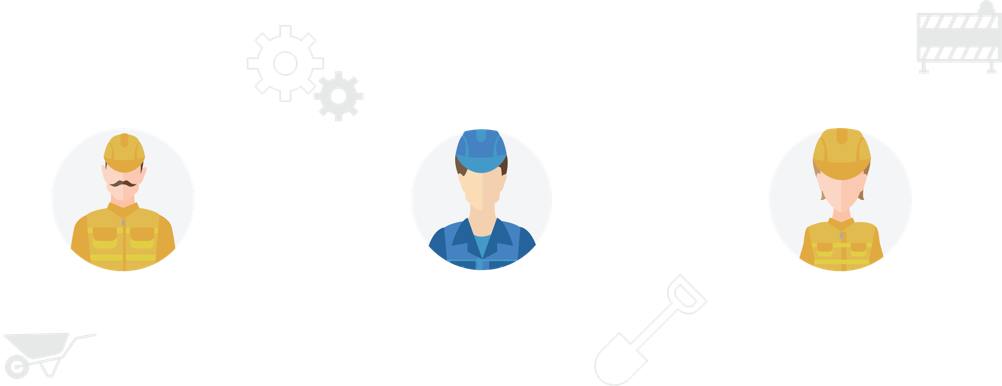
A Cement (Concrete) Finisher finishes exposed surfaces of poured concrete floors, sidewalks, curbs, and many other structures. They also smooth and finish freshly poured concrete; apply curing or surface treatments; and restore, repair, or replace hardened concrete structures.
Job Related Skills, Interests and Values
- Learning about and applying health and safety training to the job
- Finishing concrete by hand or machine; produce various finishes using different compounds and techniques, including colours and decorative finishes
- Cut, core, and scarify hardened concrete into pre-determined forms or shapes
- Operating hand/power tools to compact and level concrete and create the desired finish
- Installing fixtures including anchor bolts, steel plates, and door sills
- Repairing/replacing worn/damaged sections and applying curing and surface treatments
- Exposing and finishing aggregate in precast and architectural concrete
- Ability to follow instructions; willing to work as team on physically/mentally challenging projects
What Preparation and Training Do You Need?
- Grade 10 is the legal minimum, but grade 12 is usually required by employers/unions
- Voluntary trade; apprenticeship is not mandatory but is recommended
- Completion of 4,500-hour apprenticeship includes on-the-job and in-school training (two 8-week blocks of school)
- Exam to obtain Certificate of Qualification
What's Your Future as a Cement or Precast (Concrete) Finisher (244 G/L)?
- Weather-dependent
- Overtime required
- Fast-paced
- Heavy-lifting
- Working both indoors and outdoors
Wage Rate
Apprentice wage increases with skill and experience. Fully qualified workers earn an average of $31.80-$40.41 per hour.
Self-Rating
Cement or Precast (Concrete) Finisher (244 G/L)
| Ask Yourself: | Yes | No |
|---|---|---|
| Do you have good hand-eye coordination? Do you have any artistic ability and enjoy working with your hands and mind? | ||
| Are you able to work indoors and outdoors? Are you comfortable working at all heights? | ||
| Are you able to read blueprints and measurements accurately? Have basic math skills. | ||
| Are you able to follow Health & Safety guidelines? | ||
| Are you able to lift more than 50lbs? Are you able to stand or sit for long periods of time? | ||
| Are you detail oriented? Do you have the ability to work closely with others? | ||
| Are you reliable, a self-starter and able to work with minimal supervision? Can you start and finish work on time? |
If you checked YES to the majority of these questions, a career as a Cement or Precast (Concrete) Finisher (244 G/L) may be for you!
You might want to look at these similar trades as well;
- Cement Mason
- Bricklayer
- Stone Cutter
- Marble Mason
Concrete is moulded to create many different shapes and forms, including slabs or panels, called precast concrete pieces, for building walls or floors. Often a Hoisting Engineer/Crane Operator will lower pieces into place, and the role of the Precast Concrete Erector is to guide this tradesperson, using hand signals, to align the panels and slabs into place.
Concrete Pump Operators coordinator the placement of ready-mix concrete through a pump at job sites, set up concrete delivery systems, monitor the movement of concrete to its destination, and resolve issues related to the pouring of pumped concrete.
Brick & Stone Masons prepare and lay bricks, concrete blocks, stone, and other masonry units to construct/repair structures like walls, patios, arches, fireplaces, and chimneys. They may also lay materials used in the construction of industrial furnaces, retorts, and boilers.
A Native Residential Construction Worker may work in any aspect of constructing a First Nations home, from excavating to finishing electrical or carpentry. They are trained in carpentry, electrical, and plumbing.
Restoration Masons do similar work to cement masons and bricklayers; however, their work is done on structures years after the original work was performed. Specialized Restoration Masons may repair and restore heritage buildings and monuments, including chimneys, smokestacks, foundations, furnaces, kilns, and forges.
Cement Masons direct the pouring of concrete and smooth and finish freshly poured concrete.
Reinforcing Rodworkers reinforce concrete. To do this, they fabricate, handle, sort, cut, bend, rig, place, burn, weld and tie all materials used to reinforce the concrete, including steel. They then install the steel and accessories in the building of all types of concrete structures including bridges, reservoirs, buildings, sewers and highways.
Terrazzo, Tile & Marble Setters cover interior and exterior walls, floors, and ceilings with decorative and/or protective terrazzo, tile, or marble finishes. The job is varied – a setter could line a swimming pool with mosaic floors one day and tile a kitchen backsplash the next.